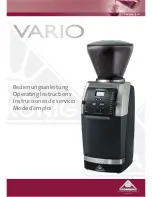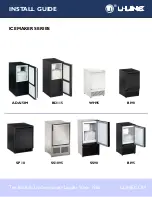
extraction of bitter oils and release less caffeine than any other
brewing method. You will always make the absolute freshest
and most aromatic cup of coffee. This is the reason why many
European restaurants and hotels serve fresh pressured brewed
coffee only. Experiment with your new machine and prepare
yourself the best and most enjoyable cup of coffee!
3b. DIFFERENT COFFEE DRINKS
Here are some guidelines for the most popular coffee drinks:
• Ristretto: 1/2 to 1 oz. of coffee. Sweeten to taste
• Espresso: 1 to 2 oz. coffee. Sweeten to taste
• Double Shot: 3 to 4 oz. of coffee. Sweeten to taste
• Crema Coffee: 5 to 8 oz. of coffee
• Cappuccino: Espresso plus 3 to 4 oz. of hot frothed milk.
• Latte: Espresso plus 3-5 oz. steamed milk with little or no froth.
• Café Mocha: Make Espresso then add chocolate syrup to the
milk before frothing/steaming.
Experiment with the size of your milk based drinks. For stronger
coffee taste add more coffee, for more milk taste use more
frothed milk.
3c. COFFEE FACTS
•
Caffeine
is tasteless. A "strong" coffee or espresso is mostly
the result of the amount of coffee in relation to the amount of
water. The longer a bean is roasted, the less caffeine it has.
•
Arabica and Robusta
are two genetically different kinds of
beans. "Arabica" beans have more flavor and a little less caffeine
than "Robusta" beans which are mostly used in lower priced
coffees and instant coffees.
•
Espresso
is not a bean, it's the way the coffee is roasted and
prepared. Typical US espresso roasts result in darker beans with
an oily outside. European espresso roasts are medium brown
with no or very little oils showing on the outside.
Please note:
Dark, oily beans: see chapter 7.
4. PLEASE, DON’T... (or you void your warranty protection):
• Never pull out the drawer during the brewing process.
• Never fill instant coffee into the bean container or ground coffee
funnel; it can damage the brewing chamber.
• Never fill sugar coated coffee beans into the bean container.
• Never fill frozen beans into the bean container. If you store
beans in the freezer, let them thaw for 3 to 4 hours before
filling them into the bean container.
• Never fill anything other than coffee beans into the bean
container (no chocolate, rice, nuts, spices, etc.)
• Never fill anything but fresh, cold clean water into the water
container, except when decalcifying (chapter 20b).
• Never use mineral or carbonated water. You can use tap
water, spring water, distilled water and reverse osmosis water.
• Never repair or open the machine yourself. All repairs should
be performed only by an authorized service center.
PLEASE, DO...
• Fill water tank with fresh, cold water only.
• Remove any foreign particles (small stones) from coffee beans.
• Let frozen beans thaw for 3 to 4 hours before pouring them
into the bean container.
10.










































